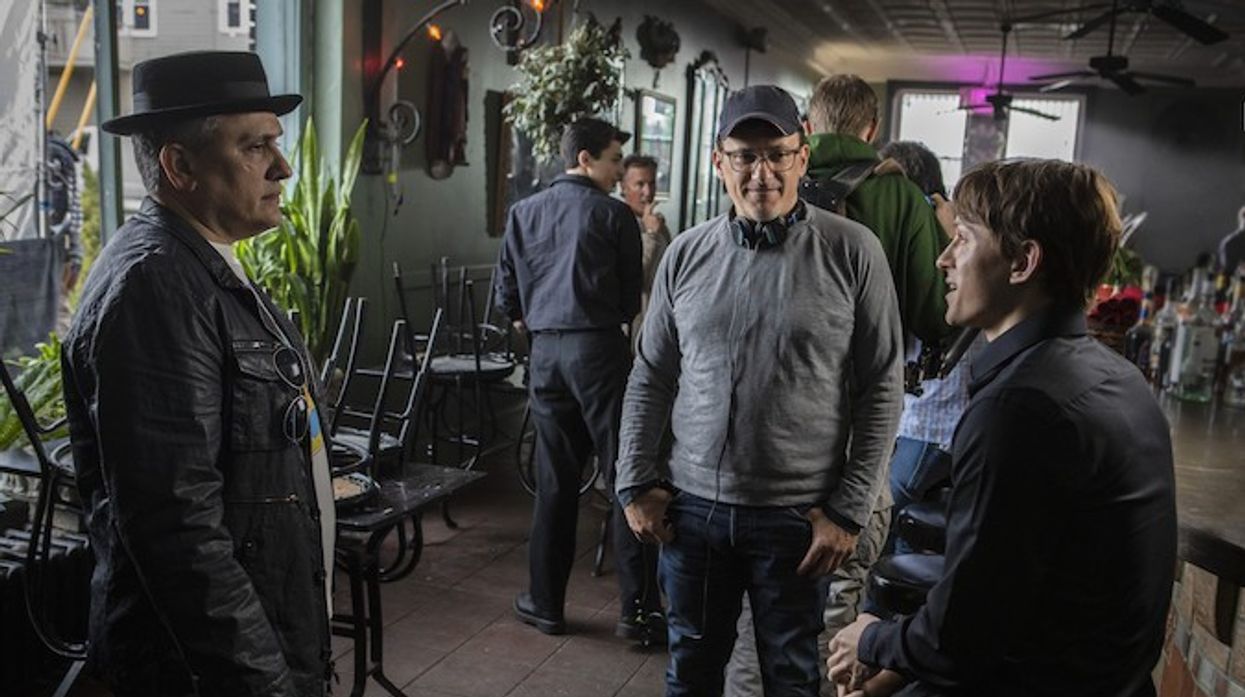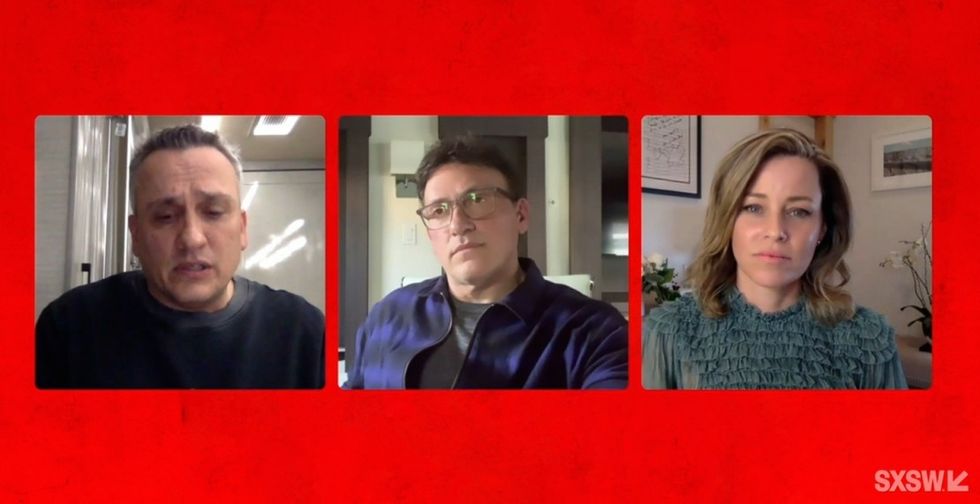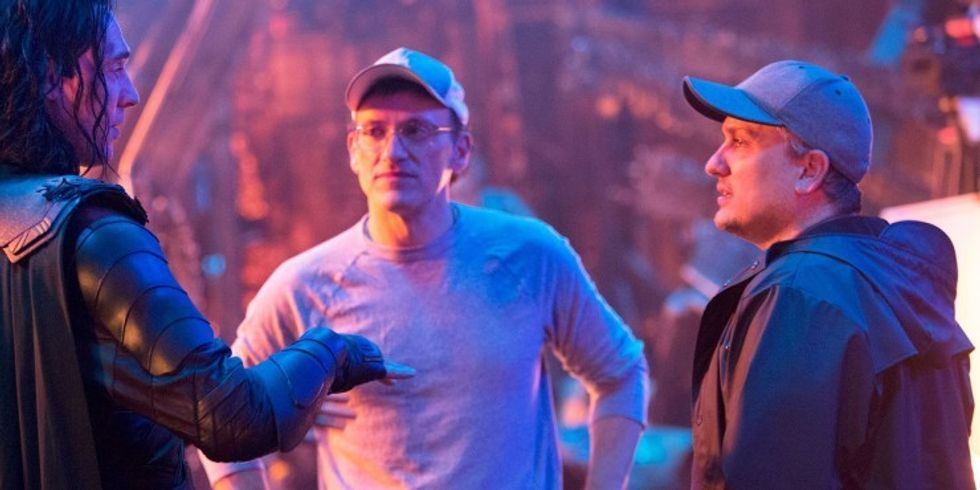The Russo Brothers Explore PTSD Through Lens Choice and Aspect Ratio in ‘Cherry’
Anthony and Joe Russo tackle the opioid crisis through an Iraq vet. Their tips? Let the real deal inform the cinematography.

At a recent SXSW 2021 conversation moderated by Elizabeth Banks, the Russo Brothers (Arrested Development, Avengers: Endgame) sat down to talk about their film Cherry, which stars Tom Holland and is based on the critically acclaimed novel by Nico Walker. The film is fictional but took many elements from Walker’s own life, who negotiated the film rights from jail.
While making a "war film for this moment," the filmmakers set out to share how we got to the opioid epidemic in part from the dark days of post-9/11 and the reality of sending young, ill-prepared Americans to fight wars overseas. To do so, they spend a lot of time with addicts and people with PTSD.
“The train you how to kill, but not how to come home,” said Joe Russo.
No Film School took notes from the iconic filmmakers. First, watch the trailer for Cherry. Then read our takeaways.
Why shooting Cherry in Cleveland was a dream
The Russo Brothers shot a chunk of the movie in Cleveland, where much of the novel is set and where the brothers grew up. Knowing those locations made adapting the book all the more relevant.
“A lot of locations in the book are areas we grew up in,” said Joe Russo. “Nico and I worked in the same restaurant 10 years apart. We had similar middle-class upbringings in Cleveland and very different outcomes. So as filmmakers, we read a book and visually create a movie in your head based on the places. What was tricky is how to execute it tonally and who to play it. But to be able to go home and work with all the friends and family who made our first credit card movie, was great.”
Why you should cast for charisma and let your actors be collaborators
To play the role of Cherry, the Russo Brothers cast Tom Holland, who you know as the young Peter Parker. Of course, they first discovered him in that search for Spider-Man.
“He auditioned from 100s if not 1,000s of people,” said Anthony Russo. “When he left we said ‘that kid!’ He had charisma [and] bravery. He was an important collaborator on the project. He and our other actress spent a lot of time with addicts, loved ones with PTSD.”
Knowing when chapter headings work on-screen
Chapter headings—do we love them or hate them? You’ll get an eye-roll or groan as often as a thumbs up. But for the Russo Brothers, It’s all about whether or not they work for the film. Here, the story was the evolution of a human being, so it worked.
“It was the life cycle of his life, which were made up of distinctive experiences,” said Joe Russo. “For us, it was what we thought was best to make the film as subjective as possible. Very early on we thought, ‘Let's break it into chapters, and give an overriding principle for each chapter.’ It was hard to unify, but each chapter represented something, from falling in love, anxiety, depression, hiding from the world."
How to explore PTSD through lens choice and perspective
Much of the Cherry character is spent going through traumatic war experiences in Iraq before returning to the United States and developing a subsequent opioid addiction. For the brothers, the filmmaking had to reflect each internal space, and this is how they described it.
“We ascribed magical realism to that opening,” said Joe Russo of the pre-war Cherry. “We see lenses that keep figures in focus while everything else goes soft. When you move to boot camp, an intelligent, educated kid gets training for war, and finds training woefully inadequate. We closed down the aspect ratio and went with only one wide-angle lens, which becomes distorted with the aspect ratio.
“Once in Iraq, we use longer takes to set in the woeful preparation for the large-scale violence. We have a drone shot of insurgents, the drone passes over [Cherry], then the camera operator picks up the drone. We go to the next shot, and the operator lets go, as the drone travels over humvees and arrives as Cherry’s unit shows up. There a second camera operator exiting the vehicle as a soldier.
“For PTSD, there is a detached irony and drug addiction. This eventually leads to lyricism and poetry is redemption when [Cherry is] incarcerated. Eventually, his mind is going to go quiet and be able to listen again. That’s the epiphany, and we change the directionality of his spiral."

The Russo Brothers on why storytelling is more important than ever
Banks asked the Russo Brothers, how we can do better for everybody? They responded with the emphatic idea that films need to help us break through to people.
“Technology is conspiring against us, we’ve become the product, and the product is an unthinking object,” said Anthony Russo. “We’re being manipulated by misinformation in ways we could have never predicted. I worry that we’re not built to survive the internet."
“Empathy is a critical component of our collective survival,” said Joe Russo, “Our movie is trying to make links to people who suffer from addiction. Unless we find empathy again we’re going to be in trouble.”
For more, read our ongoing coverage of the 2021 SXSW Festival.













